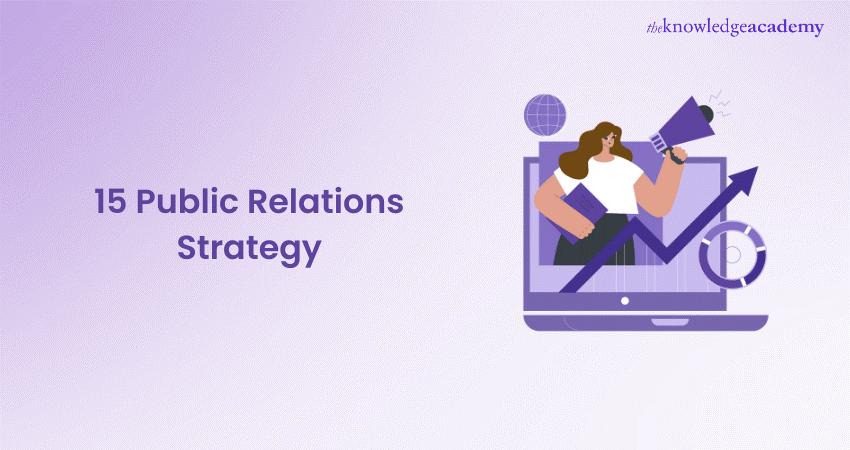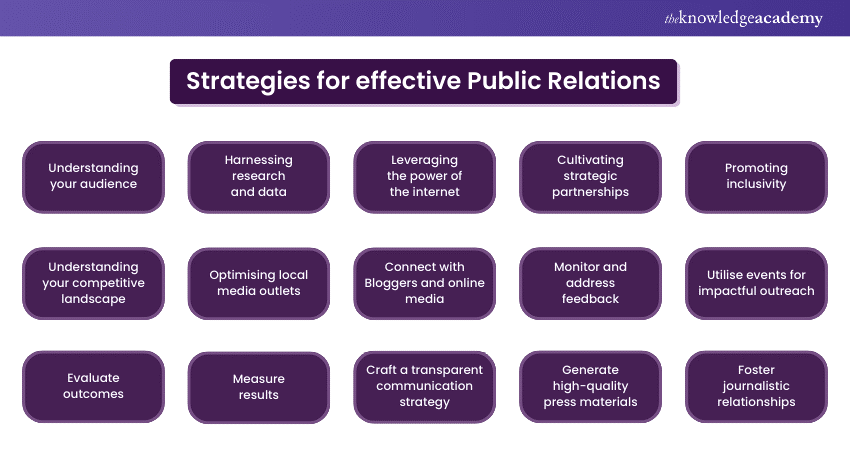We may not have the course you’re looking for. If you enquire or give us a call on +48 221041849 and speak to our training experts, we may still be able to help with your training requirements.
Training Outcomes Within Your Budget!
We ensure quality, budget-alignment, and timely delivery by our expert instructors.

In the strategic world of Public Relations, where perception is reality, every communication is an opportunity. This blog delves into Public Relations Strategy that can transform how you connect with your audience, shape your brand’s narrative, and navigate the ever-evolving media and public opinion landscape. Embrace the power of PR and learn how to craft a presence that’s seen, felt, and remembered.
Table of Contents
1) What are Public Relations Strategies?
2) 15 strategies for effective Public Relations
a) Understanding your audience
b) Harnessing research and data
c) Leveraging the power of the internet
d) Cultivating strategic partnerships
e) Promoting inclusivity
f) Understanding your competitive landscape
g) Optimising local media outlets
h) Connect with Bloggers and online media
i) Monitor and address feedback
3) Conclusion
What are Public Relations Strategies?
Public Relations Strategies are the blueprint for how organisations communicate with the public, media, and stakeholders. They encompass a variety of tactics aimed at shaping the public’s perception of a brand or company.
At their core, these strategies involve crafting messages that resonate with audiences and manage the company’s reputation. Additionally, they help foster a positive image aligning with the organisation's goals and values.
Effective Public Relations Strategies are not just about handling crises or spinning negative stories into positive ones. They are also about proactive engagement and building a consistent brand narrative.
Furthermore, they include understanding the audience’s needs, staying ahead of trends, and being transparent in communications. These strategies also involve monitoring public opinion and engaging with the community. Additionally, they include disseminating the organisation’s messages using various platforms.
15 strategies for effective Public Relations
An effective public Relations Strategy is crucial for any organisation looking to enhance its image, communicate with stakeholders, and navigate the complex media landscape. Here are 15 strategies that can help you achieve PR success:

Understanding your audience
Understanding your audience is crucial to any successful Public Relations Strategy. It involves digging deep to comprehend who your audience is, what they care about, and how they prefer to receive information.
By knowing your audience's demographics, interests, and preferences, you can effectively tailor your messaging and outreach efforts to resonate with them. This understanding enables you to craft compelling narratives and engage with your audience meaningfully, fostering trust and loyalty.
Harnessing research and data
Research and data are powerful tools in shaping your Public Relations initiatives. Conducting thorough research allows you to gather insights into market trends, competitor strategies, and audience behaviours.
Analysing this data allows you to uncover opportunities, foresee potential obstacles, and make well-informed choices regarding your PR campaigns. Whether utilising surveys, conducting focus groups, or employing analytics tools, leveraging research and data empowers you. It helps you fine-tune your messaging, pinpoint the appropriate audience segments, and gauge the effectiveness of your endeavours.
Leveraging the power of the internet
The internet presents unparalleled avenues for connecting and interacting with your intended audience in the current digital era. With platforms like social media, online forums, and blogs, you have many channels to communicate your message and share stories in diverse ways.
By leveraging the power of the internet, you can amplify your brand's presence, interact with your audience in real time, and share compelling content that resonates with them. Embracing digital platforms allows you to extend your reach, build relationships, and shape perceptions dynamically and interactively.
Cultivating strategic partnerships
Strategic partnerships are crucial in expanding your brand's reach and credibility. By collaborating with like-minded organisations, influencers, and industry leaders, you can tap into new audiences, gain endorsements, and enhance your brand's reputation.
Cultivating strategic partnerships requires identifying mutually beneficial opportunities, fostering trust and mutual respect, and aligning your goals and values with your partners'. Whether through co-branded campaigns, joint events, or cross-promotional activities, strategic partnerships can amplify your PR efforts and unlock new growth opportunities.
Promoting inclusivity
Promoting inclusivity is a moral imperative and a strategic advantage in Public Relations. By incorporating diversity and inclusivity into your messaging and actions, you broaden your appeal to a wider audience while showcasing your dedication to social responsibility. Promoting inclusivity involves representing diverse perspectives, cultures, and experiences in your communications and actively supporting marginalised communities.
By fostering an inclusive environment, you can build trust, loyalty, and goodwill among your audience, driving long-term success and impact.
Learn to shape narratives and build relationships with our Introduction to Public Relations Course today!
Understanding your competitive landscape
Understanding your competitive landscape is essential for developing a strategic advantage in Public Relations. By analysing your competitors' strengths, weaknesses, and strategies, you can pinpoint opportunities for setting yourself apart and fostering innovation.
Understanding your competitive landscape involves conducting market research, monitoring industry trends, and benchmarking your performance against key competitors. By staying abreast of your competitors' actions and reactions, you can anticipate challenges, capitalise on market gaps, and position your brand for success.
Optimising local media outlets
Local media outlets provide valuable opportunities for reaching niche audiences and building grassroots support. By optimising your outreach efforts to local media outlets, you can generate publicity, enhance brand visibility, and connect with community stakeholders.
Optimising local media outlets involves tailoring your pitches and stories to resonate with local interests and values and building relationships with Journalists and Editors in your target markets. Leveraging local media outlets can amplify your PR efforts and strengthen your ties to the communities you serve.
Connect with Bloggers and online media
In today's digital landscape, Bloggers and Online Media Influencers wield significant influence over consumer opinions and behaviours. Connecting with Bloggers and online media outlets allows you to tap into their engaged audiences, gain valuable endorsements, and amplify your brand's visibility. Connecting with Bloggers and online media involves:
a) Building genuine relationships
b) Providing them with valuable content and experiences
c) Engaging with their audiences authentically
Monitor and address feedback
Feedback is an important source of insights and opportunities for improvement in Public Relations. You can gauge audience sentiment, identify issues, and address concerns by actively monitoring feedback channels like social media, customer reviews, and surveys. Monitoring and addressing feedback involve the following:
a) Listening to your audience
b) Responding promptly and transparently
c) Taking proactive steps to resolve issues and improve the Customer Experience (CX)
Utilise events for impactful outreach
Events provide unique opportunities for engaging with your audience, building relationships, and showcasing your brand's personality and values. Whether through trade shows, conferences, or community events, utilising events for impactful outreach can generate buzz, attract media attention, and foster meaningful connections with key stakeholders.
Utilising events involves careful planning, strategic messaging, and creative activations that resonate with your target audience and align with your brand objectives. Utilising events as avenues for storytelling and interaction enables you to make a lasting impact on your audience and achieve tangible outcomes for your PR endeavours.
Elevate your marketing prowess with our Marketing Courses – sign up today!
Evaluate outcomes
Evaluating outcomes is essential for assessing the effectiveness of your PR initiatives and informing future strategies. By measuring key performance indicators and metrics, such as media coverage, brand sentiment, and audience engagement, you can quantify the effectiveness of your initiatives and identify improvement areas.
Evaluating outcomes involves setting clear objectives, tracking progress against goals, and analysing data to draw actionable insights. Whether through qualitative feedback or quantitative analytics, evaluating outcomes enables you to refine your strategies, optimise resource allocation, and maximise ROI.
Measure results
Measuring results is crucial for demonstrating the value and impact of your PR efforts to stakeholders. By quantifying the outcomes of your campaigns and initiatives, you can provide concrete evidence of your contributions to organisational goals and objectives. Measuring results involves collecting and analysing data from various sources, such as media monitoring tools, website analytics, and customer surveys.
Further, you can evaluate performance and spot trends by monitoring metrics like impressions, reach, and conversion rates. Additionally, you can use data-driven insights to enhance your PR Strategies.
Craft a transparent communication strategy
Transparency is the cornerstone for establishing trust and credibility with your audience in Public Relations. Communicating openly and authentically can foster meaningful connections, mitigate risks, and uphold your brand's reputation. Crafting a transparent communication strategy involves:
a) Being honest and forthcoming in your messaging
b) Disclosing relevant information
c) Addressing concerns and questions openly
Generate high-quality press materials
High-quality press materials are essential for capturing the interest of Journalists and securing media coverage for your brand. Whether it's press releases, media kits, or multimedia content, your press materials should be well-written, visually appealing, and tailored to the interests of your target media outlets. Generating high-quality press materials involves:
a) Crafting compelling stories
b) Incorporating relevant data and visuals
c) Adhering to journalistic standards and best practices
Foster journalistic relationships
Establishing strong relationships with Journalists is essential for gaining media coverage and shaping perceptions of your brand. Through cultivating trust, mutual respect, and transparent communication, you position yourself as a dependable reservoir of information and perspectives for Journalists to rely on. Fostering journalistic relationships involves:
a) Cultivating connections
b) Understanding Journalists' interests and preferences
c) Providing them with timely and relevant story ideas and resources
Unlock the power of persuasive storytelling with our Content Marketing Course – sign up now!
Conclusion
We hope you read and understand this blog on "15 Public Relations Strategy". Effective Public Relations Strategies are vital for shaping a brand’s narrative and forging meaningful connections. By implementing them, organisations can ensure their message resonates with their audience and build lasting relationships that stand the test of time.
Frequently Asked Questions

A Public Relations Strategy is essential for managing your brand’s reputation, increasing awareness, and building trust with your audience. It helps navigate crises and ensures consistent, positive messaging across all platforms.

A well-executed Public Relations Strategy can build a strong brand reputation, foster customer loyalty, and establish thought leadership. It helps in creating a narrative that resonates with your audience, ensuring sustained growth and a competitive edge.

The Knowledge Academy takes global learning to new heights, offering over 30,000 online courses across 490+ locations in 220 countries. This expansive reach ensures accessibility and convenience for learners worldwide.
Alongside our diverse Online Course Catalogue, encompassing 17 major categories, we go the extra mile by providing a plethora of free educational Online Resources like News updates, Blogs, videos, webinars, and interview questions. Tailoring learning experiences further, professionals can maximise value with customisable Course Bundles of TKA.

The Knowledge Academy’s Knowledge Pass, a prepaid voucher, adds another layer of flexibility, allowing course bookings over a 12-month period. Join us on a journey where education knows no bounds.

The Knowledge Academy offers various Marketing Courses, including Public Relations, Content Marketing and Email Marketing Courses. These courses cater to different skill levels, providing comprehensive insights into Digital Marketing.
Our Digital Marketing Blogs cover a range of topics related to Public Relations, offering valuable resources, best practices, and industry insights. Whether you are a beginner or looking to advance your Public Relations skills, The Knowledge Academy's diverse courses and informative blogs have you covered.
Upcoming Digital Marketing Resources Batches & Dates
Date
 Introduction to Public Relations
Introduction to Public Relations
Fri 7th Mar 2025
Fri 2nd May 2025
Fri 4th Jul 2025
Fri 5th Sep 2025
Fri 7th Nov 2025







 Top Rated Course
Top Rated Course



 If you wish to make any changes to your course, please
If you wish to make any changes to your course, please


